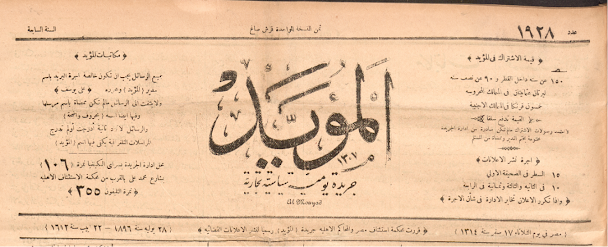News, Leaks, and Propaganda in Modern Egypt
hosted by Maryam Patton
| In times of conflict, state governments can be especially sensitive about protecting secrets. When new technologies are involved, like the telegraph, confusion over how exactly it functions and whether it is secure invite new debates over the nature of knowledge and what the public has the right to know. In this episode, Chloe Bordewich discusses her research about news, leaks, and propaganda in modern Egypt. By highlighting a particular court case around the turn of the 20th century involving leaks of sensitive military information and telegraph operators, Bordewich shows how Egypt was at the center of a global story involving the Egyptian public's right to knowledge, new technologies, and the pressures of colonialism.

 | Click for RSS Feed | 
|

|
In times of conflict, state governments can be especially sensitive about protecting secrets. When new technologies are involved, like the telegraph, confusion over how exactly it functions and whether it is secure invite new debates over the nature of knowledge and what the public has the right to know. In this episode, Chloe Bordewich discusses her research about news, leaks, and propaganda in modern Egypt. By highlighting a particular court case around the turn of the 20th century involving leaks of sensitive military information and telegraph operators, Bordewich shows how Egypt was at the center of a global story involving the Egyptian public's right to knowledge, new technologies, and the pressures of colonialism.
Contributor Bios
 |
Chloe Bordewich is a postdoctoral fellow in public history at Boston University. Her research focuses on empire, technology, and the control of information in 19th- and 20th-century Egypt. |
 |
Maryam Patton is a PhD candidate at Harvard University in the joint History and Middle Eastern Studies program. She is interested in early modern cultural exchanges, and her dissertation studies cultures of time and temporal consciousness in the Eastern Mediterranean during the fifteenth and sixteenth centuries. |
Credits
Episode No. 543
Release Date: 6 May 2023
Recording Location: Cambridge, MA
Sound production by Maryam Patton
Bibliography and images courtesy of Chloe Bordewich
Further Listening
 |
Arthur Asseraf | 295
1/23/
17
|
The Politics of News in Colonial Algeria |
 |
Ahmet Ersoy | 309
3/30/17
|
Everyday Life and History in Ottoman Illustrated Journals |
 |
Aaron Jakes | 475
9/7/20
|
Nationalism and Capitalism in British-Occupied Egypt |
 |
Hoda Yousef | 247
7/11/16
|
Literacies and the Emergence of Modern Egypt |
 |
Khaled Fahmy | 180
12/20/14
|
Law and Order in Late Ottoman Egypt |
 |
Eve Troutt Powell | 283
11/25/16
|
Narratives of Slavery in Late Ottoman Egypt |
 |
Pascale Ghazaleh | 449
2/11/20
|
The Language of Protest in 19th Century Egypt |
Images

Masthead of the newspaper al-Mu'ayyad at the time it printed the leaked telegram from Sudan in July 1896

Morse receiver from the book Telgrafçılık (1895) by Mehmet Ali.
Select Bibliography
ʿAbduh, Ibrahim. Tarikh bi-la Wathaʾiq. Cairo: Muʾassasat Sijill al-ʿArab, 1975.
Asseraf, Arthur. Electric News in Colonial Algeria. Oxford: University Press, Oxford University Press, 2019.
Barak, On. On Time: Technology and Temporality in Modern Egypt. University of California Press, 2013
Bayly, C. A. Empire and Information: Intelligence Gathering and Social Communication in India, 1780-1870. Cambridge; New York: Cambridge University Press, 1996.
Blair, Ann, Paul Duguid, Anja-Silvia Goeing, and Anthony Grafton, eds. Information: A Historical Companion. Princeton: University Press, 2021.
Douin, Georges. Histoire Du Règne Du Khédive Ismaïl: L’empire Africain, vol. III, pt. 1-3. Cairo: L’Imprimerie de L’Institut Français d’Archéologie Orientale, for La Société Royale de Géographie d’Égypte.
El-Ariss, Tarek. Leaks, Hacks, and Scandals: Arab Culture in the Digital Age. Princeton: University Press, 2019.
Jamal, Shawqi ʿAta Allah, ed. al-Wathaʾiq al-Tarikhiyya li-Siyasat Misr fi al-Bahr al-Ahmar, 1863-1879. Cairo: Maṭbaʿat Lajna al-Bayan-al-ʿArabi, 1960.










Comments
Post a Comment
Due to an overwhelming amount of spam, we no longer read comments submitted to the blog.